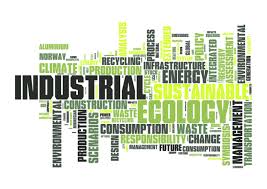|
Read the text and get ready to a test work
INDUSTRIAL ECOLOGY
 1. Industrial ecology is the shifting of industrial process from linear (open loop) systems, in which resource and capital investments move through the system to become waste, to a closed loop system where wastes become inputs for new processes. Much of the research focuses on the following areas:
· material and energy flow studies
· dematerialization and decarbonization
· technological change and the environment
· life-cycle planning, design and assessment
· extended producer responsibility
· product-oriented environmental policy
· eco-efficiency, etc.
2. Industrial ecology proposes not to see industrial systems (for example a factory, an eco-region, or national or global economy) as being separate from the biosphere, but to consider it as a particular case of an ecosystem. It is the idea that if natural systems do not have waste in them, we should model our systems after natural ones if we want them to be sustainable.
3. Along with more general energy conservation and material conservation goals, and redefining commodity markets and product stewardship relations strictly as a service economy, industrial ecology is one of the four objectives of Natural Capitalism. This strategy discourages forms of amoral purchasing arising from ignorance of what goes on at a distance and implies a political economy that highly values natural capital.
4. The scientific field Industrial Ecology has grown fast in recent years and its principles are emerging in various policy realms such as the concept of the Circular Economy that is being promoted in China. Although the definition of it has yet to be formalized, generally the focus is on strategies such as creating a circular flow of materials, and cascading energy flows. An example of this would be using waste heat from one process to run another process that requires a lower temperature. This maximizes the efficiency of energy use. The hope is that strategy such as this will create a more efficient economy with fewer pollutants and other unwanted by products.
From Wikipedia
Test
1. Industrial ecology is the shifting of industrial process from linear (open loop) systems, in which resource and capital investments move through the system to become waste, to a closed loop system where wastes become inputs for new processes. Much of the research focuses on the following areas:
· material and energy flow studies
· dematerialization and decarbonization
· technological change and the environment
· life-cycle planning, design and assessment
· extended producer responsibility
· product-oriented environmental policy
· eco-efficiency, etc.
2. Industrial ecology proposes not to see industrial systems (for example a factory, an eco-region, or national or global economy) as being separate from the biosphere, but to consider it as a particular case of an ecosystem. It is the idea that if natural systems do not have waste in them, we should model our systems after natural ones if we want them to be sustainable.
3. Along with more general energy conservation and material conservation goals, and redefining commodity markets and product stewardship relations strictly as a service economy, industrial ecology is one of the four objectives of Natural Capitalism. This strategy discourages forms of amoral purchasing arising from ignorance of what goes on at a distance and implies a political economy that highly values natural capital.
4. The scientific field Industrial Ecology has grown fast in recent years and its principles are emerging in various policy realms such as the concept of the Circular Economy that is being promoted in China. Although the definition of it has yet to be formalized, generally the focus is on strategies such as creating a circular flow of materials, and cascading energy flows. An example of this would be using waste heat from one process to run another process that requires a lower temperature. This maximizes the efficiency of energy use. The hope is that strategy such as this will create a more efficient economy with fewer pollutants and other unwanted by products.
From Wikipedia
Test
|
|